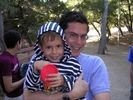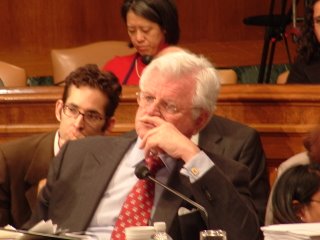My Journal Article on Vegetarianism and Subsequent Commentary
This article appeared in the Jewish Journal, March 3, 2006: http://www.jewishjournal.com/home/searchview.php?id=15493
I Love You, Carnivore
by Rabbi Jonathan Klein
I Love You, Carnivore
by Rabbi Jonathan Klein
This column is in response to last week’s Torah Portion by Rabbi Zoë Klein, who confessed her secret enjoyment of meat, despite her family’s predominantly vegetarian diet.
To: My Not-So-Flesh-Eating Wife
From: Her Closeted Carnivorous/Publicly Vegetarian Husband
From: Her Closeted Carnivorous/Publicly Vegetarian Husband
Worry not, my dear, your struggle is safe with me over vegetarianism. I try to be one, but you know the truth of my dilemma, although it is less debilitating for me than it is for you. After 20 years, I think I’m close to being true to myself when I ignore the leftover Shabbos schnitzel from our Hillel caterer.
You see, as you know, I love meat. Love it! Growing up, although it wasn’t kosher, I took extra delight in my mother’s marinated flank steak. She also made great meatballs, and do I ever miss Shake N’ Bake chicken. How fun it was to overcook hotdogs until they blistered on the grill outside, while watching “60 Minutes” on Sunday evenings as a family.
I have absolutely no repulsion toward seeing carcasses; only a sadness that others are troubled by it. Ultimately, “we are like vanity; our days are as a shadow that passes,” as you and I read when we officiate at funerals, so why not accept that the life on the paper plates used in our homes for the kids eating a little meat is temporal? When medical shows present brain surgeries, complete with machines sucking the blood away, I can watch without any angst.
You, on the other hand, must turn the station, and at the site of roadkill, you bristle and say, “God bless it.” Actually, thank you for teaching me to do the same.
“Does it really matter if I don’t turn off the water while I brush my teeth?” one of my environment-conscientious students queried me the other day. Elizabeth had been caught by another conservationist in the throes of committing what some consider a chilul Hashem, desecration of that which was holy. Wasting water is an act of bal tashchit, our tradition’s way of saying that we are stewards of the planet and as such, we have no right to waste or destroy needlessly.
“Industries and big businesses waste far more water every day than people do brushing their teeth and watering their lawns,” she added. “Truth be told, I knew that I should turn off the water faucet, but does it really matter?”
“Maybe the key is to try to turn it off but not feel immense guilt for keeping it on, since it has virtually no effect on the environment,” I offered as a compromise. She seemed content.
As we left this “lunch ‘n’ learn” at USC’s health science campus, I had an epiphany. I wondered whether Elizabeth was channeling Torah from Sinai for me with my struggle to conquer my yetzer hara, the evil impulse toward consuming fleishigs: If I privately eat the Persian kabob leftovers after our weekly Wednesday barbecue, so that no one knows and it has no impact on anyone, might that be the ideal?
My act of civil disobedience — refusing to consume the flesh of once-living, breathing animals — has virtually no effect, perhaps none whatsoever. Agribusiness decides far in advance how many cows to raise and then slaughter without regard to my individual case.
My act of civil disobedience — refusing to consume the flesh of once-living, breathing animals — has virtually no effect, perhaps none whatsoever. Agribusiness decides far in advance how many cows to raise and then slaughter without regard to my individual case.
It is almost entirely unlikely that the good folks at Rubashkin’s or some other slaughterhouse would ever take an inventory that would reflect my decision. It seems that being a vegetarian in America is as effective for slowing down meat production as trying to convince our son, Rocky, that muesli tastes better than marshmallows.
However, perhaps eating leftovers is still a kiddush Hashem, a sanctification of these animals. Kabbalah teaches that when we eat foods, we elevate the divine sparks within them, so by consuming these leftovers, I am ensuring that these sparks are not wasted. It would be wrong to let the leftovers get dumped, as that would certainly be a violation of the law of bal tashchit.
The purposeful consumption of leftover meats then makes sense. However, if anyone were to find out that I was not a true vegetarian, they might never consider a vegetarian lifestyle. This would betray my values: While I can’t individually change the meat production levels in this society, creating a vegetarian movement would help keep cows jumping over the moon in perpetuity. I’m pretty much convinced that had my sister, Sylvia, never been a vegetarian, I might have never ended up in this dilemma, which pits my conscience against my cravings.
So, dear, continue to chew gum after eating a hamburger in order to mask the taste of once-living animals on your breath. Even as I argue for public vegetarianism with a strictly private consumption of leftovers, I am beginning to reach the point where even my interest in meat is disappearing. One too many PETA videos, I suppose.
Hoisting and shackling the cows horrifies me, and while kosher, I would much rather take my cues from the likes of Shlomo Goren, Isaac Bashevis Singer, S.I. Agnon and A.D. Gordon, not to mention Albert Einstein, Leonard Cohen and Bob Dylan, all famous Jewish vegetarians.
Our prayers are for Moshiach, a messianic era in which the world order will improve in its very essence. When I say “Bayom Hahu,” on that day, I join Rav Kook in imagining a world when we need not sacrifice animals on any altar ever again.
I love you, even if you do sneak a roast beef sandwich from time to time.
Jonathan Klein is the Allen and Ruth Ziegler rabbinic director at USC Hillel.
This Article elicited the following letter to the editor:
Vegetarians
Jonathan Klein may not realize it, but he is indeed helping to save countless lives by “refusing to consume the flesh of once-living, breathing animals” (“I Love You, Carnivore,” March 3). It is estimated that each vegetarian saves 83 animals every year.
The Jewish religion has an entire code of laws mandating that animals be treated with compassion. “Tsa’ar ba’alei hayim” is the commandment to prevent the suffering of all living beings.
In addition to saving animals, vegetarians also save more water, land and resources than just about anyone else on the planet. And, of course, vegetarians are far less likely to die from heart disease, cancer and other diseases, so we can spend more time with our loved ones.
I have been vegan for 17 years, and I don’t miss meat one bit, because mock meats have basically the same taste and texture as meat. There is a lot of helpful information on vegetarianism at JewishVeg.com. I encourage everyone to check it out.
Stewart David
Asheville, N.C.
I'm happy to see this response. Why is vegetarianism often exiled in the public image to the realm of fanatics who are socially awkward, misanthropes and the like? Vegetarianism is about intentional living, ensuring that everything one does measures up to a sensitivity and keen awareness of its impact on others. I see my liking for the taste of meat as a liability, something that causes me to turn away from my true values. I only wish that others would be honest with their inner essence and recognize why eating the flesh of once-living animals only serves to distort the truth of human accomplishment, that we are the Crown of Creation, capable of moving beyond the "hunter and gatherer" mentality of a primitive species into an enlightened 21st century cultural milieu. If one can live without eating once-living-turned-killed cows, chickens, fish, and anything else, then why consume them? When cow meat or chicken meat (let's get away from "beef," "pork," "poultry," which are euphemistic avoidances for what it really is) costs as much as a veggie burger on the menu, something is seriously wrong in our society. McDonalds and other fast food chains market their cow burgers at extremely low prices; if the pain of the animals could only be heard.
The mitzvah of Tzaar Ba'alei Chayim in the 21st century must include the unnecessary consumption of animals. If one can avoid meats, they should. If one is so overwhelmed with a biological need to consume meats, something I personally doubt is real but rather perceived, at least consider consuming animals as completely as possible, choosing fish over cows since more of the fish is actually consumed by percentage. Consider the way of the Eskimo, who legend has it use every part of the whale that they would by necessity kill.
I hope that my article was read not as an acceptance of my wonderful wife's diet but rather as my empathy with her struggle. Vegetarianism is a very hard lifestyle to adopt later in life. But just because it is hard doesn't suggest that it shouldn't be adopted, does it? It is hard to be a Jew, our folklore teaches. So what's a little more hardship, when it means taking unnecessary pain and death away from the animal kindom?
May we see the day when vegetarianism sweeps this nation and beyond. And perhaps as important, may we recognize a time when people expressing extra sensitivities toward the Other are no longer ridiculed and are instead seen as the prophets of our time.



